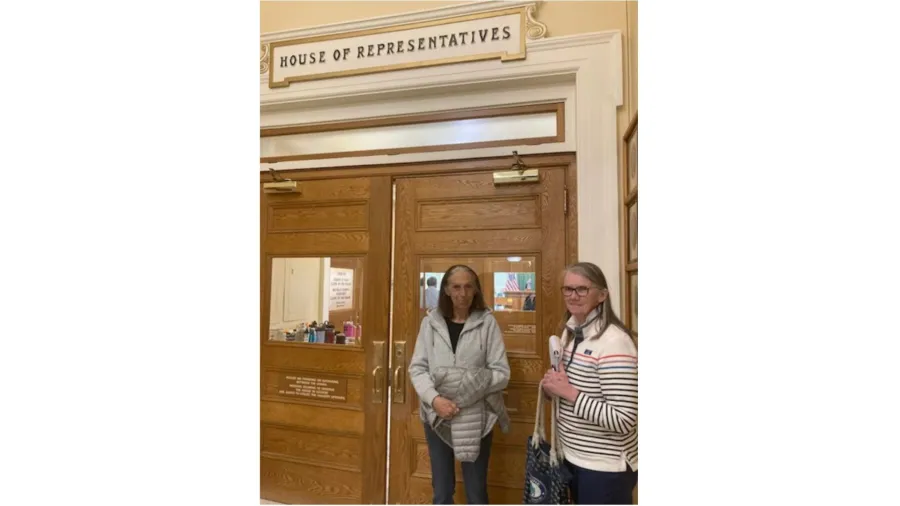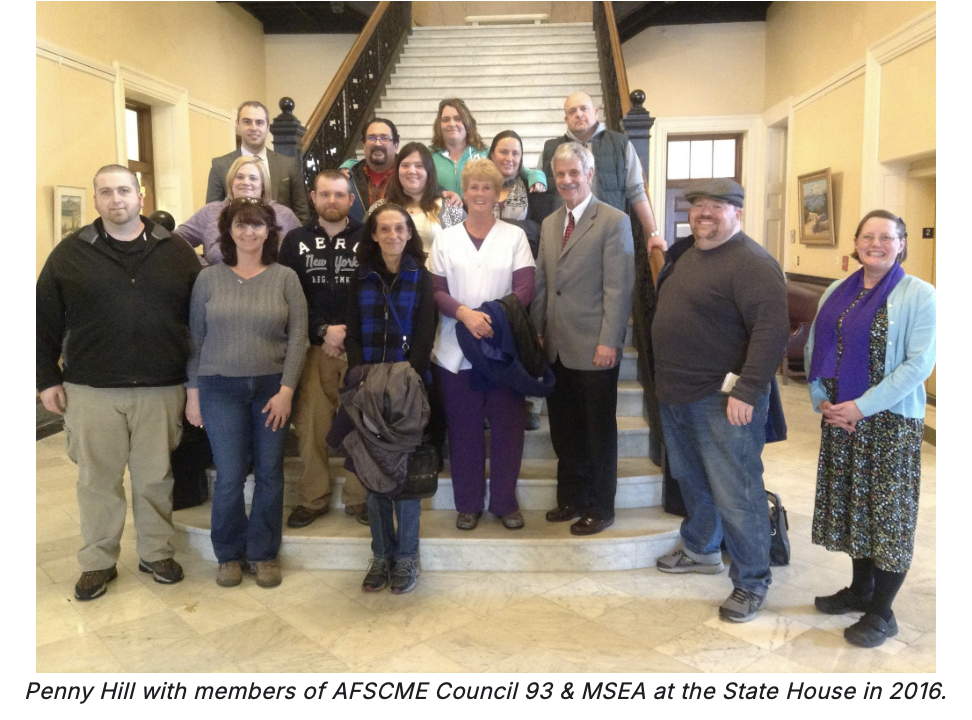Penny Hill (AFSCME 1814) Becomes First Mental Health Worker to Retire Under New Special Retirement Plan

Penny Hill and Sally Nichols AFSME 1814 at the State House in Augusta.
Penny Hill (AFSME 1814) was 22 years old when she began working with some of the most severely mentally ill people in the state. She started working at the former Augusta Health Institute (AMHI) in 1987 and continued working there when it became Riverview Psychiatric Center. Now, after 38 years, she is retiring thanks to a law that allows mental health workers at the two state psychiatric hospitals - Riverview in August and Dorothea Dix in Bangor, to retire at 55 after 25 years of service under a special Maine Public Employees Retirement System plan.
Hill would not have been able to retire if she and her union sisters and brothers (AFSCME 1814 and 1825) had not fought for over a decade for a law that puts mental health workers in the same retirement plan with firefighters, law enforcement and corrections officers. They went to the State House to testify and lobby their legislators year after year until finally this past June a new state budget passed with funding for the program. Hill is one of 80 mental health workers at the two hospitals who will benefit from the new plan in recognition of the dangerous work that they do.
“I feel free now,” said Hill from her home in Sidney. “We’ve fought so long for years for this and we finally got it. It's a good feeling.”
Hill grew up in Auburn, but spent a lot of time at AMHI growing up. Mental illness runs in her family and her biological mother was pregnant with her during a stay at the psychiatric hospital. Hill’s older brother was also horribly abused by her father and ended up at AMHI after suffering a mental breakdown at age 18.
“I remember when I was 14, 15 years old, going in and visiting him there, meeting people there and being part of his treatment team there with my parents,” said Hill.
Hill says she sees her career at the psychiatric hospital as “my way of giving back” after seeing the care the workers there provided to her family members. After she had worked at the hospital for 17 years, a new 92-bed civil and forensic psychiatric treatment facility was built to replace the now-old state hospital. Riverview began taking a lot more forensic patients, many of whom had committed gruesome crimes but were found not criminally responsible due to their mental illness. Despite their horrific crimes, Hill is able to see their humanity.
“You look at them and you know they're truly sick. You know they're real remorseful for what they did,” she said. “If they weren't sick, they would have never done that. So it's really hard to look at them with anything other than compassion.”
It's a tremendous feeling, she says, when a patient is able to recover with proper treatment and live a normal life on the outside without ever having to return to Riverview.
“I've had like three or four of them that have left a real big spark in my heart,” said Hill.

In 2013, an investigation of Riverview found that it was overcrowded, inadequately staffed, and had used improper methods to control patients, including the use of tasers. As a result, the federal Centers for Medicare and Medicaid Services (CMS) rescinded the hospital’s certification, pulling $20 million in federal funds from the facility. It wasn’t until 2019 that CMS re-certified Riverview. Short staffing was the driving force for union members at Riverview to lobby for a more robust retirement package to boost employee recruitment and retention.
Patients are frequently verbally abusive and occasionally physically attack workers at the facility. Hill has been assaulted three times in her career. Her daughter was stabbed when she was pregnant with her granddaughter while working at Riverview. Unlike law enforcement or corrections officers, Riverview workers do not use tasers, billy clubs or pepper spray to subdue patients acting violently. It’s meant to be a therapeutic clinical setting, not a prison.
“All we have is our hands and our mouths, she said. “It’s pretty sad because we deal with the ones that the prisons can't. If they're truly sick or behavioral, they come to us.”
As more and more staff suffered severe injuries on the job due to short staffing, Hill and her colleagues decided they had to do something to improve staff recruitment and retention. When correction officers were made eligible for the special retirement plan, they questioned why they were ineligible, despite handling some of the most dangerous people in the criminal justice system.
With the backing of AFSCME Council 93 and the Maine AFL-CIO, Riverview and Dorothea Dix workers began telling their stories to the Legislature’s Labor Committee. While lawmakers sympathized with their struggles, year after year they watched as their legislation either died or went unfunded at the end of each session. Their testimonies were an embarrassment to the Riverview administration and the workers knew that they were taking a risk in speaking out about conditions at the facility. Several times, Hill and her colleagues were retaliated against and written up for minor infractions after testifying at the Legislature.

Riverview workers with Senator Troy Jackson at the State House.
But they persevered and kept coming back to the State House to tell their painful stories in the hopes of finally winning a plan that would allow them to retire with dignity.
“I swore when I started there that I was gonna walk out on my two feet,” said Hill. “Nobody was gonna wheel me out of there.”
Finally, after ten years, they won and Hill was finally able to retire after serving her patients for nearly four decades. Some people have asked if she would like to go back to work per diem at Riverview, but Hill’s response is always, “No, once I walk out this door, I won't return.” But she’s not done working and plans to apply to work part time at “someplace fun and exciting.”
“I don't want to work a full time job because I don't like driving in the wintertime in the snow, but a couple days a week will suit me,” she said.
She says she hopes the example her AFSCME sisters and brothers have set in winning this important victory will serve as an inspiration for other workers to never give up the fight.
“I think it's a real inspiration to other folks who want to make changes in the workplace and pass legislation,” said Hill. “If you're dedicated and truly want something, you'll fight until you get it.”
